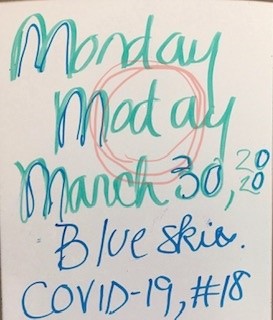By Jill Stewart
Ok, so everybody needs a proofreader!
During this public health crisis, the experts tell us we need a routine.
Here’s mine:
Every morning I wake up, make a pot of coffee, and then post the date and a little weather report on the family whiteboard.
Sometimes I try to be clever with song references, like today: “Monday, Monday … (can’t trust that day)” lyrics I knew would evoke The Mamas and the Papas 1966 classic, and that my husband Dave would get it.
I headed to my attic office for the first of three conference calls.
Then I received his text: “Guess everyone needs a proofreader.”
Oops!
And it got me to thinking, do typos really matter during a pandemic? I asked Dave, my original co-editor, and he said, “Yes, now more than ever.”
Immediately I thought about the classic lesson on why commas count:
“Let’s eat, Gramma!”
vs.
“Let’s eat Gramma!”
Which, for lack of a single comma, would have us cannibalizing our beloved Gram. Terrifying even in ordinary times.
But do typos and their relatives really matter? Everyone’s busy, distracted, bored, and worried. Do we have the energy to fully copyedit and proofread our work right now?
As I launch my spring quarter classes online, I asked a couple of writing pros what they thought:
- “In these difficult times, the most important commodity any company or media outlet has is trust. If you can maintain your normal editorial controls and create prose that’s as close to perfect as possible, you avoid jolting the reader away from that trust. Sure, they’ll give you a break on typos right now — they know it’s a stressful time for you, too — but why risk it?” – Josh Bernoff, author of Writing Without Bullshit and blogger at https://t.co/eGxx9m3E79.
- “The vast majority of students I work with leave their writing to the last possible minute, which usually means they don’t have enough time for editing or proofreading. But failing to plan for those two tasks is like failing to plan for a pandemic. It leaves you in a terrible situation, where you’re scrambling against all odds. Instead, write as quickly as you can — ignoring the rules of spelling and grammar. Then, spend twice as much time (as you did writing) editing and then proofreading your text. Writing will be a whole lot more enjoyable. And your final product will be so much better.” – Daphne Gray-Grant, The Publication Coach, daphne@publicationcoach.com
- “Let’s compare doing our best as writers to the broadcast journalists reporting from their homes right now because they can’t be in the newsroom. Are they showing up in front of their iPhones and webcams with bed hair and wrinkled clothing? No. They look just like they do in the studio because they’re professionals who respect their viewers, and they show that by continuing to do the best work possible. As writers, we owe this to our readers, too. Relaxing your work environment by writing from home rather than from a busy outside office doesn’t mean relaxing your professional standards.” – Sandra Beckwith, freelance writer, author, and book marketing coach. https://sandrabeckwith.contently.com/
So, whether you are writing for a school assignment or a client, consistency of message and clarity of style still matter to your professionalism and your credibility. Take the time, make the time to copyedit and proof thoroughly. This is your brand in good times and bad.

